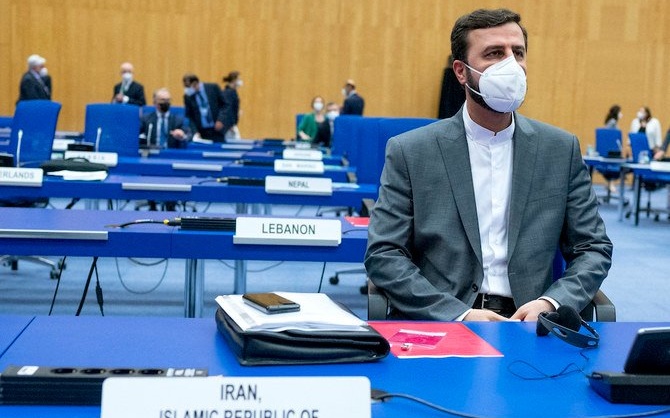Iran’s envoy to the International Atomic Energy Agency, Kazem Gharibabadi attends the IAEA Board of Governors meeting, Vienna, Austria, June 7, 2021 (AFP)
UPDATE, JUNE 29:
Iran’s Foreign Ministry has walked back the declaration that Tehran is ending its agreement with the International Atomic Energy Agency over inspections of nuclear sites.
Spokesman Saeed Khatibzadeh told reporters on Monday, “No decision, either negative or positive has been made. Neither the continuation of the deal nor the erasure [of video surveillance data]. We are in the previous position for the time being.”
Government spokesman Ali Rabiei added on Tuesday morning:
#Iran government spokesman Rabiei: We're considering the necessity & possibility of extending the technical agreement with @IAEAOrg, & we'll consider all options in this regard… If not extended, we’ll work with the IAEA solely based on safeguards…No decision has been made yet.
— Abas Aslani (@AbasAslani) June 29, 2021
UPDATE, JUNE 28:
Parliament Speaker Mohammad Baqer Qalibaf emphasized Sunday that Iran will permanently withhold video surveillance tapes of nuclear sites from the International Atomic Energy Agency.
Qalibaf told legislators, “The agreement has expired….Any of the information recorded will never be given to the International Atomic Energy Agency and the data and images will remain in the possession of Iran.”
#Iran parliament speaker Qalibaf said that the technical agreement with @IAEAOrg has not been extended & that none of the recordings of the Iranian nuclear sites would be provided to the IAEA. pic.twitter.com/cWn6Yky5Sq
— Abas Aslani (@AbasAslani) June 27, 2021
A senior Iranian lawmaker linked the threat to the IAEA to the ongoing talks in Vienna, brokered by the European Union, about the 2015 nuclear agreement.
Mahmoud Abbaszadeh Meshkini, the spokesman for Parliament’s National Security and Foreign Policy Committee, said, “If the sanctions are not removed, we will not only block their access to files and photos, but also turn off cameras as well.”
Speaking alongside French Foreign Minister Jean-Yves Le Drian in Paris on Friday, US Secretary of State Antony Blinken said Iran’s refusal to extend the IAEA agreement would be a “serious concern” for the Vienna negotiations.
Abbaszadeh Meshkini snapped, “Blinken’s remarks are aimed at gaining concessions through a psychological warfare….[The US cannot] demand anything from us, because it needs the agreement more than we do.”
ORIGINAL ENTRY, JUNE 27: Iran is threatening to end its agreement with the International Atomic Energy Agency over inspection of Iranian nuclear sites.
IAEA head Rafael Grossi said on Friday that Tehran has gone silent over the extension of the agreement, which expired on Thursday: “Iran had not replied to his letter or indicated whether it intends to maintain the current arrangement….An immediate response from Iran is needed in this regard.”
Rather than corresponding with Grossi, Iran’s envoy to the IAEA, Kazem Gharibabadi, used Twitter to claim the extension was not obligatory.
of recording has nothing to do with Iran’s safeguards obligations. Undoubtedly, any decision to be taken by Iran in this regard, would only be based on its political considerations, and the Agency can not, and should not, consider it as a something it was entitled to.
— Gharibabadi (@Gharibabadi) June 25, 2021
Gharibabadi reiterated to Tasnim News “that Iran was not required to comply” with the IAEA.
On Wednesday, Mahmoud Vaezi, chief of staff to outgoing President Hassan Rouhani, said the Supreme National Security Council will take a decision on whether to extend the arrangement with the IAEA at its next meeting.
“Engage Without Further Delay”
Tehran began restricting IAEA access in January. It refused “snap” inspections and withheld all video surveillance tapes.
Grossi and Iranian officials agreed a three-month extension to the expiring agreement on February 21, and a one-month extension in May. However, Iran continued to withhold the tapes monitoring nuclear facilities on a 24/7 basis.
A US official said, “Iran should engage the IAEA without further delay to ensure appropriate measures remain in place so the IAEA’s continuity of knowledge on JCPOA monitoring can be readily reestablished.”
Russia’s envoy to the IAEA expressed concern:
The #IAEA hasn’t yet received a confirmation from #Iran that temporary understandings on verification will continue to work. Hopefully the positive answer will follow soon. It would allow to avoid uncertainties which can have unjustifiable long- lasting negative effects.
— Mikhail Ulyanov (@Amb_Ulyanov) June 25, 2021
Last weekend the Vienna talks on a renewal of the 2015 nuclear deal were adjourned, with Iran saying that a deal could be reached in the next round. The discussions are seeking US re-entry, after the Trump Administration’s withdrawal in May 2018; lifting of American sanctions, and an Iranian return to compliance with a rollback of enrichment of 20% and even 60% uranium.
In his first public speech, President-elect Ebrahim Raisi — the hardline choice of the Supreme Leader’s office — struck a tough pose. He said all US sanctions must be removed, without any reference to Iran’s return to compliance, and echoed Ayatollah Khamanei’s refusal to discuss any issues over the region and Tehran’s ballistic missile program.
Three weeks ago, Grossi called on Iran to provide information about its nuclear program “without further delay”. He cited Tehran’s failure to answer questions about the discovery of uranium particles at three former undeclared sites.
Grossi cautioned Iranian leaders, “This is going to affect the credibility of your country in general and the chances for any bigger wider agreement that you want to enter with your counterparts in the JCPOA [2015 nuclear deal.”


More worker groups joining the strikes…
https://www.radiofarda.com/a/iranian-wokers-strike-expand/31327645.html
Several large labor sectors and social groups are joining the strikes. The main oil sector has a set a date to join the strikes.
https://www.radiofarda.com/a/iran-mass-woker-strikes/31326279.html
https://iranintl.com/en/iran-in-brief/petrochemical-workers-go-strike-iran-demanding-higher-pay